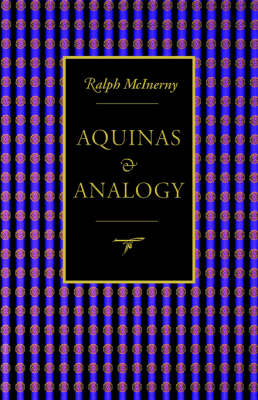
Aquinas and Analogy
Seiten
1998
The Catholic University of America Press (Verlag)
978-0-8132-0932-6 (ISBN)
The Catholic University of America Press (Verlag)
978-0-8132-0932-6 (ISBN)
"De nominum analogia" by Cajetan introduces a spurious argument that is not found in Aquinas's writing. This text traces the source of the confusion to Cajetan's misunderstanding of a text from Aquina's commentary on the "Sentences" and shows how misleading that distinction is.
In his De nominum analogia, Cajetan introduced a spurious distinction between analogy of attribution and analogy of proportionality that is not found in Aquinas's writings or anywhere else. Cajetan's mistake became a commonplace and it is still uncritically accepted today. In Aquinas and Analogy,/em>, Ralph McInerny carefully traces the source of the confusion to Cajetan's misunderstanding of a text from Aquinas's commentary on the Sentences and shows how unwarranted and how misleading that distinction is. Another source of confusion has been the attempt to equate the Greek word analogia and its Latin equivalent to try to find word for word correspondences between Aristotle and Aquinas. For instance, what Thomas calls analogy of names is consonant rather with what Aristotle describes as legetai pollachôs, what ""is said in many ways."" McInerny brings in all relevant texts and analyzes the points they make, and he makes comparisons with the famous notion of focal meaning used by the Oxford philosopher G.E.L. Owen.
McInerny shows how the word 'analogy' is itself analogous and gives an enlightening exposé of the analogy of names. He criticizes Enrico Berti's and Ramirez's influential treatments of analogy, as well as those of a few others for unaccountably falling under the spell of Cajetan's errors. He takes the reader further still into the question of the 'analogy of being' and also of the 'argument by analogy.' But his conclusions steer the reader back to the momentous issues now made accessible by a clear understanding of analogy.
The basic distinctions McInerny introduces, his criticism of the central piece in the literature, Cajetan's De nominum analogia, the applications he makes to problems such as that of the nature of metaphysics or of logic, his knowledge of contemporary debates on related topics, combine to make his contribution unique. Basic philosophical issues are renewed by this book and so is one's reading of Aquinas, Aristotle, and their many interpreters past and present.
In his De nominum analogia, Cajetan introduced a spurious distinction between analogy of attribution and analogy of proportionality that is not found in Aquinas's writings or anywhere else. Cajetan's mistake became a commonplace and it is still uncritically accepted today. In Aquinas and Analogy,/em>, Ralph McInerny carefully traces the source of the confusion to Cajetan's misunderstanding of a text from Aquinas's commentary on the Sentences and shows how unwarranted and how misleading that distinction is. Another source of confusion has been the attempt to equate the Greek word analogia and its Latin equivalent to try to find word for word correspondences between Aristotle and Aquinas. For instance, what Thomas calls analogy of names is consonant rather with what Aristotle describes as legetai pollachôs, what ""is said in many ways."" McInerny brings in all relevant texts and analyzes the points they make, and he makes comparisons with the famous notion of focal meaning used by the Oxford philosopher G.E.L. Owen.
McInerny shows how the word 'analogy' is itself analogous and gives an enlightening exposé of the analogy of names. He criticizes Enrico Berti's and Ramirez's influential treatments of analogy, as well as those of a few others for unaccountably falling under the spell of Cajetan's errors. He takes the reader further still into the question of the 'analogy of being' and also of the 'argument by analogy.' But his conclusions steer the reader back to the momentous issues now made accessible by a clear understanding of analogy.
The basic distinctions McInerny introduces, his criticism of the central piece in the literature, Cajetan's De nominum analogia, the applications he makes to problems such as that of the nature of metaphysics or of logic, his knowledge of contemporary debates on related topics, combine to make his contribution unique. Basic philosophical issues are renewed by this book and so is one's reading of Aquinas, Aristotle, and their many interpreters past and present.
Ralph McInerny is Michael P. Grace Professor of Medieval Studies and the director of the Jacques Maritain Center at the University of Notre Dame, USA, where he has taught since 1955. He is the founder and publisher of Catholic Dossier magazine, and the author of Boethius and Aquinas, Aquinas on Human Action, and The Question of Christian Ethics, all published by CUA Press.
| Verlagsort | Washington |
|---|---|
| Sprache | englisch |
| Maße | 152 x 229 mm |
| Gewicht | 333 g |
| Themenwelt | Geisteswissenschaften ► Philosophie ► Philosophie des Mittelalters |
| Religion / Theologie ► Christentum ► Kirchengeschichte | |
| ISBN-10 | 0-8132-0932-3 / 0813209323 |
| ISBN-13 | 978-0-8132-0932-6 / 9780813209326 |
| Zustand | Neuware |
| Haben Sie eine Frage zum Produkt? |
Mehr entdecken
aus dem Bereich
aus dem Bereich
von Athanasius bis Gregor dem Großen
Buch | Softcover (2024)
C.H.Beck (Verlag)
CHF 18,90
eine Geschichte der christlichen Kunst
Buch | Hardcover (2024)
C.H.Beck (Verlag)
CHF 44,75


